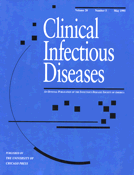-
Views
-
Cite
Cite
Michael B. Edmond, Janis F. Ober, David L. Weinbaum, Michael A. Pfaller, Taekyu Hwang, Melissa D. Sanford, Richard P. Wenzel, Vancomycin-Resistant Enterococcus faecium Bacteremia: Risk Factors for Infection, Clinical Infectious Diseases, Volume 20, Issue 5, May 1995, Pages 1126–1133, https://doi.org/10.1093/clinids/20.5.1126
Close - Share Icon Share
Abstract
We describe an outbreak of vancomycin-resistant Enterococcus faecium (vanA phenotype) bacteremia on the oncology ward of a tertiary care community hospital. In 10 of the 11 cases the patients had leukemia and were neutropenic (median duration of neutropenia, 21 days) at the time of bacteremia. On average, patients received six antibiotic agents for a total of 61 agent-days prior to development of vancomycin-resistant E. faecium bacteremia. The mortality rate was 73%. Molecular typing of 22 isolates revealed that the majority (83%) represented a common strain, indicating nosocomial spread. When the 11 cases were compared to 22 matched control patients, gastrointestinal colonization with vancomycin-resistant E. faecium (odds ratio [denominator, 0] ∞, P = .005) and the use of antimicrobial agents with significant activity against anaerobes (metronidazole, clindamycin, and imipenem; odds ratio ∞, P= .02) were found to be risk factors for the development of vancomycin-resistant E. faecium bacteremia. Since no proven therapy for such infection exists, there is an urgent need to identify effective measures to prevent and control the development of vancomycin-resistant E. faecium bacteremia.
- antibiotics
- phenotype
- vancomycin
- bacteremia
- neutropenia
- clindamycin
- disease outbreaks
- hospitals, community
- imipenem
- leukemia
- medical oncology
- metronidazole
- patients' rooms
- infections
- mortality
- antimicrobials
- microbial colonization
- vancomycin-resistant enterococcus
- nosocomial transmission
- infection risk







Comments